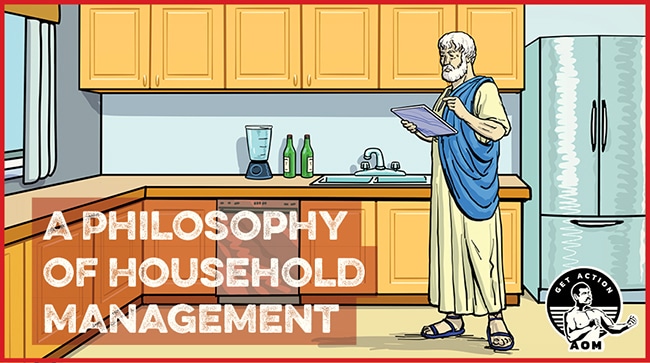
“Household management” has become something of an interest and a watchword for me this year, due to the coincidental confluence of two books coming into my life at the same time.
The first is Home Comforts: The Art and Science of Keeping House by Cheryl Mendelson. Several months ago, two friends, one male and one female, independently recommended this book to me. I hadn’t heard of it previously, but Home Comforts has been a bestseller since it was published in 1999 and was ranked by Slate as one of the 50 best nonfiction books of the past 25 years. Mendelson has an unexpected background for an author of a book about housekeeping — she’s a Harvard law grad and a professor of philosophy — and she brings a scholarly seriousness to a giant tome that’s aimed at men and women alike and unpacks the details of everything from stocking a pantry to laundering clothes to protecting a home from burglary.
While I was browsing through Home Comforts, I also came across a book called Oikonomikos or Economics by the ancient Greek philosopher Aristotle. From the title, I thought it would be about trade, monetary policy, and the like. But what I discovered was that for the ancient Greeks, economics wasn’t about those things.
The Greek word oikonomikos is better translated as household management. Aristotle’s Economics is about the role husbands and wives play in effectively organizing and marshaling the resources of a household.
What both Home Comforts and Economics got me thinking about is the bigger purpose behind home management.
Something we reflect on a great deal is that one of the biggest things lacking in the present age is context. Modern citizens go about their lives with very little context as to why they’re doing the things they do. Why get married? Why have kids? What’s the point of work?
If we operate with little context as to the why behind questions concerning life’s big pursuits, we certainly do likewise with day-to-day household tasks as well. There’s no want of content out there about how to budget or clean your bathroom, but there is almost nothing about the greater purpose behind such chores. A clean and organized household is more pleasant, surely, but is there more to why you’d want to run a home smoothly?
While Home Comforts largely covers the practicalities of keeping house, in the intro for the book, Mendelson makes the case for why such tasks are not superficial but have a significant impact on the quality of one’s life.
Aristotle argues in Economics that household management is part and parcel of achieving true happiness.
Together, they can get us to a philosophy of household management — one that can be embraced whether you live alone in a small apartment or with a big brood of kids in a sprawling home.
The Telos of Household Management
Aristotle believed that every object and person had a telos — an ultimate aim or purpose. The telos of human beings was eudaimonia, which is happiness or flourishing — a life lived to its utmost potential. Achieving eudaimonia required the pursuit of arete — excellence or virtue.
We tend to think of “virtue” in an exclusively moral sense, as having to do with qualities like courage and compassion. But for the Greeks, virtue meant doing anything well. Courage was a virtue, but so was being intelligent. Being strong was a virtue. Being a good friend was a virtue. Being able to cultivate beauty was a virtue.
For Aristotle, the telos of a home was to help the individuals living within it each achieve their personal telos.
Household management — which includes cleaning, organizing, maintenance, and budgeting, as well as safety and home defense — does this in two ways: it develops virtues in and of itself, and it creates an environment conducive to the development of further excellences.
The Virtues Developed by Household Management
It is household management, Mendelson writes, that “makes your home alive, that turns it into a small society in its own right, a vital place with its own ways and rhythms.” Aristotle argued that strengthening this small society cultivates particular virtues in its managers:
Phronesis. For the Greeks, phronesis meant practical wisdom. We’ve written in-depth about practical wisdom before, but the TLDR version is that it’s the ability to do the right thing at the right time for the right reason.
Managing a home requires you to make a lot of decisions that don’t have clear-cut answers:
- How much should we budget for vacation?
- Which roofer should we select to replace our roof?
- How much toilet paper and paper towels should we stock?
- What do we do about the kids not doing their chores?
Practical wisdom can help you make those decisions.
Phronesis is needed not only in making specific choices around household tasks, but deciding how much time to spend on those tasks versus on other activities — paid work, family recreation, etc. How often should you do chores? To what standard? What tasks should you do yourself versus delegating to a professional?
As Mendelson observes in Home Comforts, household management requires developing a special kind of “knowledge and intelligence”:
the kind that is complex, not simple, and combines intellect, intuition, and feelings. You need a memory good enough to remember how things are done, where things are, what the daily routine requires, what everyone in the home is up to as it affects housekeeping, the state of supplies, budgets, and bills. You have to be able to decipher insurance policies, contracts, and warranties, manage a budget, and master the technical language of instruction manuals for appliances and computers. The ability to split your attention in several ways and stay calm is essential. You need to exercise creative intelligence to solve problems and devise solutions: efficiency measures that save money or time; psychological or social measures to improve cooperation; steps to improve physical comfort; analyses of why and how some routines break down.
Temperance. Temperance is another virtue that Aristotle says is exercised by household management. Managing a home requires you to use your money and time wisely. If you want to achieve eudaimonia, you can’t just spend all your money on crap you don’t need or waste all your time watching Netflix. That’s a recipe for disorder. But temperance doesn’t mean being an ascetic or obsessively scrupulous either. Instead, you must develop the ability to find the golden mean in all your activities. Practical wisdom can help with that.
Discipline. Home management necessitates continence or self-control. To effectively care for and run a household, you can’t only do chores and tasks when things get so chaotic they become unbearable. You can’t tackle things in fits and starts. Instead, you have to stick to a regular budget, cleaning routine, and home maintenance schedule.
Skillfulness. For the Greeks, techne referred to making or doing — arts, crafts, and skills. And making and doing things well was a virtue. Household management has the potential to develop lots of skills. The techne for modern households includes cooking, lawn care, repairing and remodeling, budgeting, retirement planning, time management, and knowing how to navigate bureaucracies (like health insurance companies).
One skill Aristotle thought was important in household management was keeping your stuff organized — having a place for everything and everything in its place. He advocated that individuals follow the Spartans’ example in keeping their homes neat and orderly.
Health. For Aristotle, good health was a virtue, and household management is something that promotes this excellence. The regular chores required to take care of a home are some of the few tasks remaining in modern life that helpfully get us out of our chairs and ameliorate our sedentary lifestyles. Making home-cooked meals is typically better for health than buying take-out. Keeping a home clean reduces allergies. Preventing everything from accidents to home invasions increases your safety and reduces the risk of bodily harm.
Centeredness. This isn’t a virtue that Aristotle mentions, but one that has arguably become increasingly important in an age that can feel ethereal, abstract, and constantly at loose ends. Taking care of your home offers a sense of concrete control and centeredness in a time of uncertainty and instability. As Mendelson observes:
Modern housekeeping, despite its bad press, is among the most thoroughly pleasant, significant, and least alienated forms of work that many of us will encounter even if we are blessed with work outside the home that we like. . . .
Seen from the outside, housework can look like a Sisyphean task that gives you no sense of reward or completion. Yet housekeeping actually offers more opportunities for savoring achievement than almost any other work I can think of. Each of its regular routines brings satisfaction when it is completed. These routines echo the rhythm of life, and the housekeeping rhythm is the rhythm of the body. You get satisfaction not only from a sense of order, cleanliness, freshness, peace and plenty restored, but from the knowledge that you yourself and those you care about are going to enjoy these benefits.
The Virtues that Develop Out of a Well-Managed Household
Unlike the Stoics, Aristotle believed external goods were necessary for the life well-lived.
In the Nicomachean Ethics, he wrote: “Happiness needs external goods as well. For it is impossible or at least not easy to perform noble actions if one lacks the wherewithal.”
It is easier to launch one’s aspirations and endeavors from a comfortable base. But only if you keep that base orderly and secure. When your bandwidth isn’t being sucked up by the chaos of your surroundings, you can focus on developing Aristotelian virtues like philosophical contemplation, physical excellence, and professional success.
It’s also easier to continually go out into the world to pursue your ambitions when home provides a rejuvenating respite between these efforts. As Mendelson writes:
[A] sense of being at home is important to everyone’s well-being. If you do not get enough of it, your happiness, resilience, energy, humor, and courage will decrease. It is a complex thing, an amalgam. . . . It includes familiarity, warmth, affection, and a conviction of security. Being at home feels safe; you have a sense of relief whenever you come home and close the door behind you, reduced fear of social and emotional dangers as well as physical ones. When you are home, you can let down your guard and take off your mask. . . . It’s where you belong . . . Coming home is your major restorative in life.
A neat, safe, aesthetically-pleasing home also creates other goods that make up the eudaimonic life.
In having a home in which you feel comfortable hosting people, and in which people feel comfortable and restored when visiting, you strengthen friendships.
In creating a stable, welcoming environment, you facilitate the raising of happy children, who feel that their home is a refuge and have the sense of security necessary for developing their own virtues.
What’s Your Home’s Telos?
Your home can be more than just a place to eat, sleep, and watch TV.
It can be a sanctuary within which you and your family can pursue your best and highest aims.
Embracing this idea of what your home is about can change your approach to running it.
Instead of seeing the chores and life admin of managing a home as drudgery, you’ll start to see them as means to a nobler end: the creation of an environment in which virtue and happiness can flourish.
We’re planning to do more content about the practicalities of household management this year. For a good place to start in this noble pursuit, listen to this podcast:







